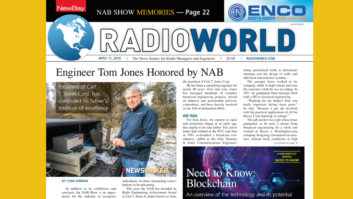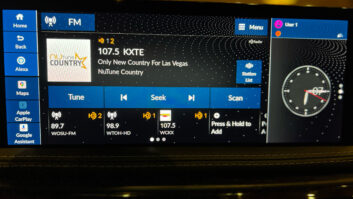The broadcasting world may have lost a pioneer and trailblazer; I lost not only my husband but the person most responsible for any success in my own career.

Don LeBrecht passed away at age 80, after nearly 40 years in the industry. We’d moved to Lakewood Ranch, Fla., to retire after I’d spent more than 35 years in broadcast news.
He had spent 17 years as head of the Broadcast Industry Council in Washington, where he worked with the National Association of Broadcasters on various public service campaigns, including literacy, alcohol and drug abuse, and AIDS awareness. Prior to that, he held management positions at major radio stations in New York, Toronto, Philadelphia and Washington, as well as with Triangle Broadcasting, Jefferson-Pilot Broadcasting and Capital Cities Communications.
The last 23 years of my career, I was with the Associated Press Broadcast News Center, where I covered everything from hurricanes to wars and every presidential campaign from 1984 to 2004. You’d also hear my signoffs on Capitol Hill, the Pentagon, the White House and State Department. As an AP senior correspondent, I also covered such things as the sniper shootings in the D.C. area and the Timothy McVeigh trials in Denver.
PUBLIC SERVICE
We’d met in Charlotte, N.C., 50 years ago while he was head of WBT(FM) and I was just an eager-beaver out of college at WBTV. Thomas Cookerly, who later became the general manager of WBTV, called Don “a real pioneer in the FM world.”
Cookerly, who later became president of Allbritton Communication’s Division in Washington, remembered when Don was running WBT(FM) in the “early” days of FM broadcasting. Cookerly added, “Most of us in the company had no idea what FM would become, but Don did. His work in Washington was extremely important.”
While at WBTV, I produced several radio and television documentaries that later won some professional awards and honors. Later, I worked at KYW Newsradio in Philadelphia and the ABC Radio Network in New York, before working at the AP Broadcast News Center in Washington. I’d also served as chair of the Congressional Radio and Television Correspondents Association.
It was Don’s years as at the Broadcast Council that he remembered with the most pleasure, believing that he might have provided some public service.
James Duffy, who was president of ABC Television Network for 15 years and worked with Don on literacy projects, called him “a genuine contributor to the growth of broadcasting.”
Since Don retired earlier than me, he always used to boast that he provided me with “logistical support.” Whenever I was traveling, he would call every morning to make certain I was awake. He would pick me up whenever I worked late at the Pentagon or on Capitol Hill, bringing a warm hamburger. He’d also drive me to some local assignments, such as the D.C. sniper shootings, to make certain I could concentrate on reporting. When I was overseas in Jordan in the buildup to the first Gulf War, he’d enlist someone at the NAB to wait in his office while he went to the restroom to make certain he didn’t miss my call.
Don’s former NAB colleague Rory Davies called him “the consummate broadcaster. No cause too little, no journey too far to travel if it helped promote the public good. His is a wonderful legacy of community service.”
I remember him as a loving, considerate and generous man known for his thoughtfulness and ability to tell stories that would bring smiles of joy to practically everyone he met.
He was taken ill while we were celebrating my birthday. He was rushed to the hospital but died shortly afterwards. We didn’t manage to make it to our 50th wedding anniversary, but we were able to celebrate the anniversary of our first date on New Year’s Eve.







